openstack--2--控制节点安装mysql和rabbitmq
生产中可以把mysql数据库单独安装到一台机器上,这里因为实验机器有限,就把mysql安装到了控制节点
其实openstack每个组件都可以安装到单独的机器上。
RabbitMQ介绍
RabbitMQ是一个消息队列产品
MQ全称为Message Queue, 消息队列(MQ)是一种应用程序对应用程序的通信方法。应用程序通过读写出入队列的消息(针对应用程序的数据)来通信,而无需专用连接来链接它们。
消息传递指的是程序之间通过在消息中发送数据进行通信,而不是通过直接调用彼此来通信,直接调用通常是用于诸如远程过程调用的技术。排队指的是应用程序通过 队列来通信。
队列的使用除去了接收和发送应用程序同时执行的要求
MQ是消费-生产者模型的一个典型的代表,一端往消息队列中不断写入消息,而另一端则可以读取或者订阅队列中的消息。
消息队列让程序做到异步处理,而这种异步处理的方式大大的节省了服务器的请求响应时间,从而提高了系统的吞吐量。

安装和配置mariadb
大多数 OpenStack 服务使用 SQL 数据库来存储信息。 典型地,数据库运行在控制节点上。OpenStack 服务也支持其他 SQL 数据库,包括PostgreSQL
安装下面3个包。mariadb这里精确到版本号了,是因为最新版的(mariadb-server-10.1.18-3.el7.x86_64.rpm) 安装和一些lib文件有冲突
[root@linux-node1 ~]# yum install mariadb-5.5.52-1.el7.x86_64 -y
Package 1:mariadb-5.5.52-1.el7.x86_64 already installed and latest version
Nothing to do
[root@linux-node1 ~]# yum install mariadb-server-5.5.52-1.el7.x86_64 -y
Package 1:mariadb-server-5.5.52-1.el7.x86_64 already installed and latest version
Nothing to do
[root@linux-node1 ~]# yum install python2-PyMySQL -y
Package python2-PyMySQL-0.7.9-2.el7.noarch already installed and latest version
Nothing to do
[root@linux-node1 ~]# cat /etc/my.cnf
[mysqld]
datadir=/var/lib/mysql
socket=/var/lib/mysql/mysql.sock
# Disabling symbolic-links is recommended to prevent assorted security risks
symbolic-links=0
# Settings user and group are ignored when systemd is used.
# If you need to run mysqld under a different user or group,
# customize your systemd unit file for mariadb according to the
# instructions in http://fedoraproject.org/wiki/Systemd [mysqld_safe]
log-error=/var/log/mariadb/mariadb.log
pid-file=/var/run/mariadb/mariadb.pid #
# include all files from the config directory
#
!includedir /etc/my.cnf.d [root@linux-node1 ~]#
default-storage-engine = innodb 默认存储引擎innodb
innodb_file_per_table 设置独享的表空间,如果不设置,会是共享表空间
collation-server = utf8_general_ci 校对规则
init-connect = 'SET NAMES utf8' 链接字符集
character-set-server = utf8 数据库建库字符集
max_connections = 4096 最大连接数
bind-address mysql监听地址
[root@linux-node1 ~]# touch /etc/my.cnf.d/openstack.cnf
[root@linux-node1 ~]# vim /etc/my.cnf.d/openstack.cnf
[root@linux-node1 ~]# cat /etc/my.cnf.d/openstack.cnf
[mysqld]
bind-address = 0.0.0.0
default-storage-engine = innodb
innodb_file_per_table
max_connections = 4096
collation-server = utf8_general_ci
character-set-server = utf8
[root@linux-node1 ~]#
[root@linux-node1 ~]# systemctl enable mariadb.service
Created symlink from /etc/systemd/system/multi-user.target.wants/mariadb.service to /usr/lib/systemd/system/mariadb.service.
[root@linux-node1 ~]# systemctl start mariadb.service
[root@linux-node1 ~]#
[root@linux-node1 ~]# netstat -lntp | grep 3306
tcp 0 0 0.0.0.0:3306 0.0.0.0:* LISTEN 1965/mysqld
[root@linux-node1 ~]#
为了保证数据库服务的安全性,运行mysql_secure_installation脚本,进行一些安全方面的配置,删除匿名用户,删除test库,设置root密码等
[root@linux-node1 ~]# mysql_secure_installation NOTE: RUNNING ALL PARTS OF THIS SCRIPT IS RECOMMENDED FOR ALL MariaDB
SERVERS IN PRODUCTION USE! PLEASE READ EACH STEP CAREFULLY! In order to log into MariaDB to secure it, we'll need the current
password for the root user. If you've just installed MariaDB, and
you haven't set the root password yet, the password will be blank,
so you should just press enter here. Enter current password for root (enter for none):
OK, successfully used password, moving on... Setting the root password ensures that nobody can log into the MariaDB
root user without the proper authorisation. Set root password? [Y/n] Y
New password:
Re-enter new password:
Password updated successfully!
Reloading privilege tables..
... Success! By default, a MariaDB installation has an anonymous user, allowing anyone
to log into MariaDB without having to have a user account created for
them. This is intended only for testing, and to make the installation
go a bit smoother. You should remove them before moving into a
production environment. Remove anonymous users? [Y/n] Y
... Success! Normally, root should only be allowed to connect from 'localhost'. This
ensures that someone cannot guess at the root password from the network. Disallow root login remotely? [Y/n] Y
... Success! By default, MariaDB comes with a database named 'test' that anyone can
access. This is also intended only for testing, and should be removed
before moving into a production environment. Remove test database and access to it? [Y/n] Y
- Dropping test database...
... Success!
- Removing privileges on test database...
... Success! Reloading the privilege tables will ensure that all changes made so far
will take effect immediately. Reload privilege tables now? [Y/n] Y
... Success! Cleaning up... All done! If you've completed all of the above steps, your MariaDB
installation should now be secure. Thanks for using MariaDB!
[root@linux-node1 ~]#
Openstack组件建库和授权
建库和授权,之前说过,除了Horizon,其它组件都用到了数据库。 可以在安装响应组件之前建库和授权。
这里我们提前建好,复制下面语句,直接在命令行执行即可,注意root密码根据自己的密码。
这里M版本的openstack,除了新建nova库,还需要新建一个nova_api库。
mysql -u root -p123456 -e "CREATE DATABASE keystone;"
mysql -u root -p123456 -e "GRANT ALL ON keystone.* TO 'keystone'@'localhost' IDENTIFIED BY 'keystone';"
mysql -u root -p123456 -e "GRANT ALL ON keystone.* TO 'keystone'@'%' IDENTIFIED BY 'keystone';" mysql -u root -p123456 -e "CREATE DATABASE glance;"
mysql -u root -p123456 -e "GRANT ALL ON glance.* TO 'glance'@'localhost' IDENTIFIED BY 'glance';"
mysql -u root -p123456 -e "GRANT ALL ON glance.* TO 'glance'@'%' IDENTIFIED BY 'glance';" mysql -u root -p123456 -e "CREATE DATABASE nova;"
mysql -u root -p123456 -e "GRANT ALL ON nova.* TO 'nova'@'localhost' IDENTIFIED BY 'nova';"
mysql -u root -p123456 -e "GRANT ALL ON nova.* TO 'nova'@'%' IDENTIFIED BY 'nova';"
mysql -u root -p123456 -e "CREATE DATABASE nova_api;"
mysql -u root -p123456 -e "GRANT ALL ON nova_api.* TO 'nova'@'localhost' IDENTIFIED BY 'nova';"
mysql -u root -p123456 -e "GRANT ALL ON nova_api.* TO 'nova'@'%' IDENTIFIED BY 'nova';" mysql -u root -p123456 -e "CREATE DATABASE neutron;"
mysql -u root -p123456 -e "GRANT ALL ON neutron.* TO 'neutron'@'localhost' IDENTIFIED BY 'neutron';"
mysql -u root -p123456 -e "GRANT ALL ON neutron.* TO 'neutron'@'%' IDENTIFIED BY 'neutron';"
检查库和用户
[root@linux-node1 ~]# mysql -u root -p123456 -e "show databases ;" |egrep "glance|keystone|neutron|nova|nova_api"
glance
keystone
neutron
nova
nova_api
[root@linux-node1 ~]# mysql -u root -p123456 -e "select user,host from mysql.user ;" |egrep "cinder|glance|keystone|neutron|nova"
glance %
keystone %
neutron %
nova %
glance localhost
keystone localhost
neutron localhost
nova localhost
[root@linux-node1 ~]#
OpenStack 使用 message queue 协调操作和各服务的状态信息。消息队列服务一般运行在控制节点上。OpenStack支持好几种消息队列服务包括 RabbitMQ, Qpid, 和 ZeroMQ。
不过,大多数发行版本的OpenStack包支持特定的消息队列服务。本指南安装 RabbitMQ 消息队列服务,因为大部分发行版本都支持它。
1. 安装包:
yum install rabbitmq-server -y
2. 启动消息队列服务并将其配置为随系统启动:
systemctl enable rabbitmq-server.service
systemctl start rabbitmq-server.service
3. 添加 openstack 用户,并设置密码(这里我实验环境设置密码也是openstack):
rabbitmqctl add_user openstack openstack
4. 给openstack用户配置写和读权限:
rabbitmqctl set_permissions openstack ".*" ".*" ".*"
[root@linux-node1 ~]# systemctl enable rabbitmq-server.service
Created symlink from /etc/systemd/system/multi-user.target.wants/rabbitmq-server.service to /usr/lib/systemd/system/rabbitmq-server.service.
[root@linux-node1 ~]# systemctl start rabbitmq-server.service
[root@linux-node1 ~]# rabbitmqctl add_user openstack openstack
Creating user "openstack" ...
[root@linux-node1 ~]# rabbitmqctl set_permissions openstack ".*" ".*" ".*"
Setting permissions for user "openstack" in vhost "/" ...
[root@linux-node1 ~]#
[root@linux-node1 ~]# netstat -lntp
Active Internet connections (only servers)
Proto Recv-Q Send-Q Local Address Foreign Address State PID/Program name
tcp 0 0 0.0.0.0:25672 0.0.0.0:* LISTEN 2607/beam.smp
tcp 0 0 0.0.0.0:3306 0.0.0.0:* LISTEN 1580/mysqld
tcp 0 0 0.0.0.0:111 0.0.0.0:* LISTEN 1/systemd
tcp 0 0 0.0.0.0:4369 0.0.0.0:* LISTEN 1/systemd
tcp 0 0 192.168.122.1:53 0.0.0.0:* LISTEN 1656/dnsmasq
tcp 0 0 0.0.0.0:22 0.0.0.0:* LISTEN 1158/sshd
tcp6 0 0 :::5672 :::* LISTEN 2607/beam.smp
tcp6 0 0 :::111 :::* LISTEN 1/systemd
tcp6 0 0 :::22 :::* LISTEN 1158/sshd
[root@linux-node1 ~]#
rabbitmq默认带了个web的插件,可以通过web来看rabbit的状态
它有下面这么多插件
列出rabbitmq的插件:
[root@linux-node1 ~]# rabbitmq-plugins list
Configured: E = explicitly enabled; e = implicitly enabled
| Status: * = running on rabbit@linux-node1
|/
[ ] amqp_client 3.6.5
[ ] cowboy 1.0.3
[ ] cowlib 1.0.1
[ ] mochiweb 2.13.1
[ ] rabbitmq_amqp1_0 3.6.5
[ ] rabbitmq_auth_backend_ldap 3.6.5
[ ] rabbitmq_auth_mechanism_ssl 3.6.5
[ ] rabbitmq_consistent_hash_exchange 3.6.5
[ ] rabbitmq_event_exchange 3.6.5
[ ] rabbitmq_federation 3.6.5
[ ] rabbitmq_federation_management 3.6.5
[ ] rabbitmq_jms_topic_exchange 3.6.5
[ ] rabbitmq_management 3.6.5
[ ] rabbitmq_management_agent 3.6.5
[ ] rabbitmq_management_visualiser 3.6.5
[ ] rabbitmq_mqtt 3.6.5
[ ] rabbitmq_recent_history_exchange 1.2.1
[ ] rabbitmq_sharding 0.1.0
[ ] rabbitmq_shovel 3.6.5
[ ] rabbitmq_shovel_management 3.6.5
[ ] rabbitmq_stomp 3.6.5
[ ] rabbitmq_top 3.6.5
[ ] rabbitmq_tracing 3.6.5
[ ] rabbitmq_trust_store 3.6.5
[ ] rabbitmq_web_dispatch 3.6.5
[ ] rabbitmq_web_stomp 3.6.5
[ ] rabbitmq_web_stomp_examples 3.6.5
[ ] sockjs 0.3.4
[ ] webmachine 1.10.3
[root@linux-node1 ~]#
开机自启动rabbitmq的管理插件(这些官方文档没有):
[root@linux-node1 ~]# rabbitmq-plugins enable rabbitmq_management
The following plugins have been enabled:
mochiweb
webmachine
rabbitmq_web_dispatch
amqp_client
rabbitmq_management_agent
rabbitmq_management Applying plugin configuration to rabbit@linux-node1... started 6 plugins.
[root@linux-node1 ~]#
[root@linux-node1 ~]# systemctl restart rabbitmq-server.service
[root@linux-node1 ~]#
[root@linux-node1 ~]# netstat -lntp
Active Internet connections (only servers)
Proto Recv-Q Send-Q Local Address Foreign Address State PID/Program name
tcp 0 0 0.0.0.0:25672 0.0.0.0:* LISTEN 3455/beam.smp
tcp 0 0 0.0.0.0:3306 0.0.0.0:* LISTEN 1965/mysqld
tcp 0 0 0.0.0.0:111 0.0.0.0:* LISTEN 1/systemd
tcp 0 0 0.0.0.0:4369 0.0.0.0:* LISTEN 1/systemd
tcp 0 0 192.168.122.1:53 0.0.0.0:* LISTEN 1337/dnsmasq
tcp 0 0 0.0.0.0:22 0.0.0.0:* LISTEN 1153/sshd
tcp 0 0 0.0.0.0:15672 0.0.0.0:* LISTEN 3455/beam.smp
tcp 0 0 127.0.0.1:25 0.0.0.0:* LISTEN 1277/master
tcp6 0 0 :::5672 :::* LISTEN 3455/beam.smp
tcp6 0 0 :::111 :::* LISTEN 1/systemd
tcp6 0 0 :::22 :::* LISTEN 1153/sshd
tcp6 0 0 ::1:25 :::* LISTEN 1277/master
[root@linux-node1 ~]#
用户名 guest 密码 guest
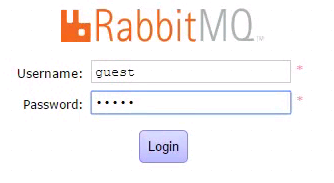
现在使用openstack用户是无法登录的
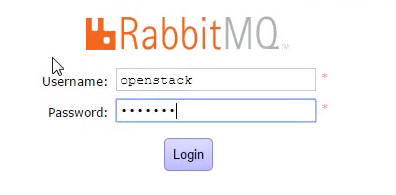
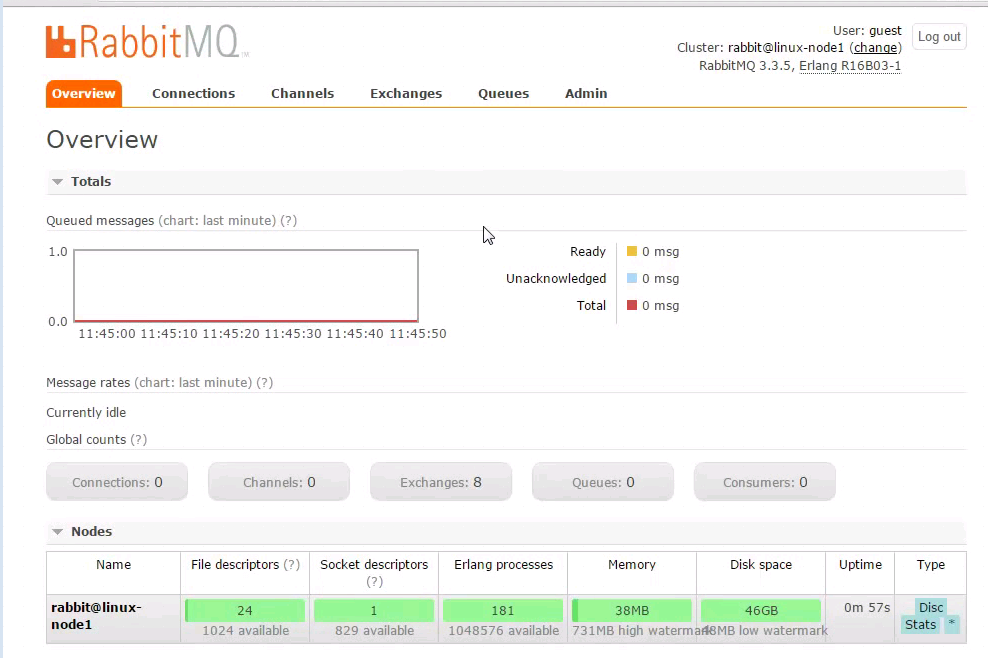

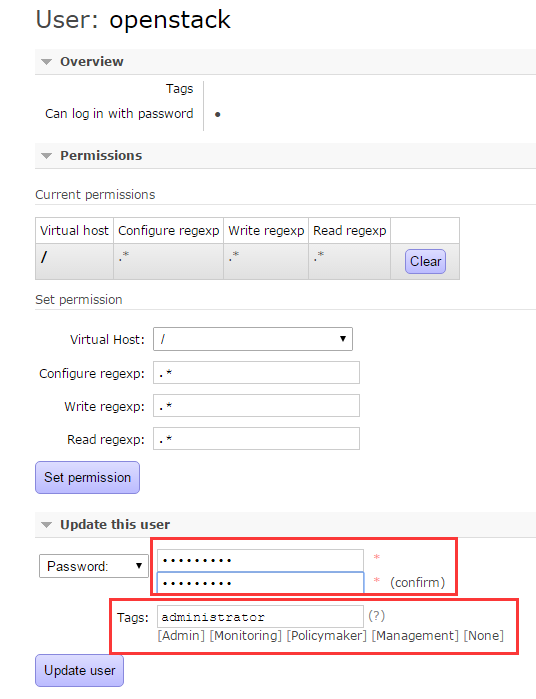
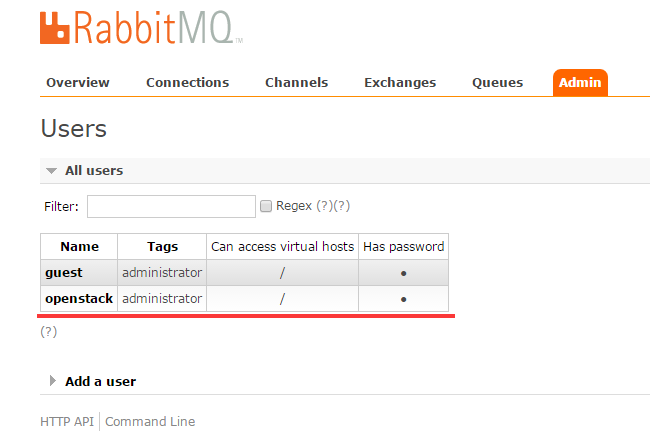

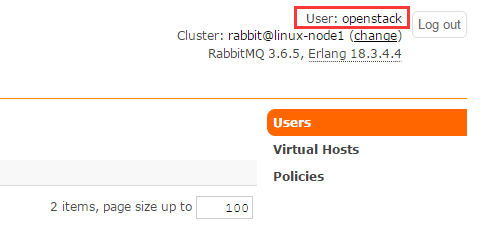

点击进去,看到如下所示,暂时和我们的实验无关。就不深入研究它了
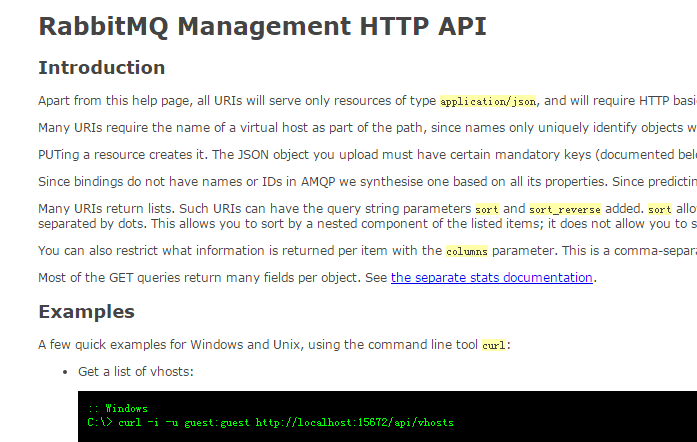
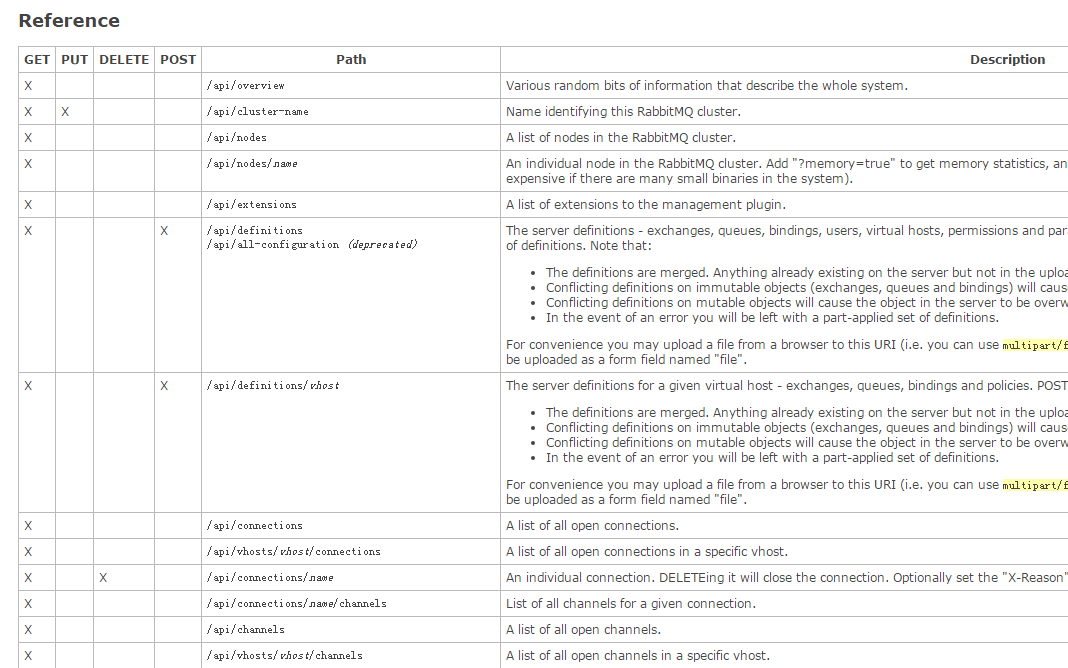
[root@linux-node1 ~]# yum install ntpdate -y
[root@linux-node1 ~]# ntpdate time1.aliyun.com
17 Feb 16:32:15 ntpdate[3951]: adjust time server 115.28.122.198 offset 0.010747 sec
[root@linux-node1 ~]# ntpdate time1.aliyun.com
17 Feb 16:32:28 ntpdate[3962]: adjust time server 115.28.122.198 offset 0.007115 sec
[root@linux-node1 ~]# date
Fri Feb 17 16:32:29 CST 2017
[root@linux-node1 ~]#
openstack--2--控制节点安装mysql和rabbitmq的更多相关文章
- openstack grizzly版cloud控制节点安装
openstack-ubuntu-create 参考官方文档 三个节点:cloud :控制节点内网:10.10.10.10外网:172.16.56.252 network:网络节点内网:10.10.1 ...
- OpenStack之三: 安装MySQL,rabbitmq, memcached
官网地址:https://docs.openstack.org/install-guide/environment-sql-database-rdo.html #:安装mysql [root@mysq ...
- 安装Rocky版OpenStack 1控制节点+1计算节点环境部署脚本
在上一篇文章中叙述了具体的安装部署过程,在这里把相应的部署脚本写出来,供大家参考: 一.执行部署的setup.sh脚本: #!/bin/bash ########################### ...
- 脚本安装Rocky版OpenStack 1控制节点+1计算节点环境部署
视频安装指南请访问: http://39.96.203.138/wordpress/document/%E8%84%9A%E6%9C%AC%E5%AE%89%E8%A3%85rocky%E7%89%8 ...
- openstack的控制节点部署
openstack的控制节点部署 主要是使用了本地安装的那个镜像. 会出现几个问题, 1.重启服务无法启动. 2.环境变量无法正确配置可以自己配置
- Openstak(M版)控制节点安装
#############修改hosts文件 # controller10.0.0.11 controller# compute110.0.0.31 compute1# block110.0.0.41 ...
- Kubernetes控制节点安装配置
#环境安装Centos 7 Linux release 7.3.1611网络: 互通配置主机名设置各个服务器的主机名hosts#查找kubernetes支持的docker版本Kubernetes v1 ...
- openstack ocata版(脚本)控制节点安装
一.初始化环境: 1.更换yum源: yum install -y wget mv /etc/yum.repos.d/CentOS-Base.repo /etc/yum.repos.d/CentOS- ...
- CentOS7安装OpenStack(Rocky版)-01.控制节点的系统环境准备
分享一下Rocky版本的OpenStack安装管理经验: OpenStack每半年左右更新一版,目前是版本是201808月发布的版本-R版(Rocky),目前版本安装方法优化较好,不过依然是比较复杂 ...
随机推荐
- spring4全注解web项目demo
记得没接触框架的时候,写demo测试时真的很爽,新建web项目,然后随便写写servlet随便调试 框架越来越多,配置记不得了,整合容易出问题,集成新东西越来越少了,不敢动了. 这是个spring4的 ...
- CSS学习笔记-01-2D转换模块
首先,mark 一下 css3 新增 的 2D 转换之 W3school 的链接: http://www.w3school.com.cn/css3/css3_2dtransform.asp 转换是使 ...
- Iscloc用法笔记
一. Iscloc的安装(使用Docker CE) 1.install Docker CE: https://www.digitalocean.com/community/tutorials/how- ...
- 2019-03-21-day016-正则表达式
昨日内容回顾 基本数据类型 编码 流程控制 文件操作 函数-内置函数 装饰器 常用模块: 序列化模块 随机数模块 os模块 sys模块 时间模块 hashlib collections re 1天半 ...
- Ubuntu16.04下通过tar.gz包安装MySQL5.5.52
1.下载 tar.gz包 : https://dev.mysql.com/downloads/mysql/ 2. // 安装依赖 sudo apt-get install libaio-dev // ...
- 性能测试-11.Linux服务器使用NMON监控指标
一.NMON使用 首先下载nmon软件http://nmon.sourceforge.net/pmwiki.php?n=Site.Download,打开这个网站下载符合自己操作系统的硬件的相关nmon ...
- 大数据-08-Sqoop入门
简介 Sqoop是一款开源的工具,主要用于在Hadoop(Hive)与传统的数据库(mysql.postgresql-)间进行数据的传递,可以将一个关系型数据库(例如 : MySQL ,Oracle ...
- 对ajax中数据的得到以及绑定的认识
1.将后台得到的数据绑定到datagrid为例: 第一种是: 后台得到的数据直接绑定到datagrid上面,如下图: 这样操作的好处在于可以使界面比较简洁. 第二种是将得到的数据作为参数的形式绑定到d ...
- 百度api--之导航
其实挺简单的,只要知道出发点和终点的经纬度就可以了; 百度webURLAPI : http://lbsyun.baidu.com/index.php?title=uri/api/web 这个是百度的a ...
- lftp的安装
lftp的安装 安装依赖的包 yum -y install make readline-devel gnutls* 解压上传的包 tar -jxf lftp-4.0.1.tar.bz2 cd到解压 ...
